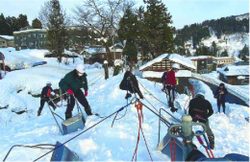Single Style / Single Friends in Japan Maintain Neighborhood Groups to Help Each Other As They Age; Groups Hold Activities, Look Out for Each Other

The members of “Koko Seven” (“Individual Seven”). From left, Reiko Ichikawa, Kimi Kawana, Yoshie Ichinotsubo and Kiku Taya in Amagasaki, Hyogo Prefecture
10:00 JST, October 21, 2024
What if people who live alone could live close to their friends in a neighborhood and help each other out as they get older?
The “Friends Living Nearby” scheme has been practiced by a group of women for 16 years. I paid a visit to Amagasaki, Hyogo Prefecture, to find out more information and to learn the secret of their long-lasting neighborhood relationship.
The “Koko Seven” (“Individual Seven”), a group formed by seven single women who wanted to maintain their lifestyle of “friends living close to each other,” is based in a condominium in the city. On the day I visited, I was greeted by four members of the group.
Kiku Taya, 89, the oldest member of the group, who lives in the condo, explained their lifestyle. “We’re not like a family. We’re just close neighbors,” she said. “We help each other but we are not dependent on each other.”
Reiko Ichikawa, 86, who lives near the condo, added: “We spend time alone or get together. We enjoy each other’s company while maintaining our self-help life. That’s what Individual Seven means.”
Yoshie Ichinotsubo, 79, and Kimi Kawana, 77, the youngest member, live in separate units in the building.
It all started about 20 years ago. Taya, who was at the time the head of a citizens group that considered matters related to aging, and Ichikawa, who was the chair of a social welfare corporation that runs a nursing home, came up with the idea of “singles living together,” along with one other person. They began asking around, saying that anyone who was seriously interested in the idea could join, including friends of friends. Four more members later joined the group, including Kawana, a journalist, and Ichinotsubo, a copywriter.
Although their backgrounds were different, with some being unmarried and others divorced, all seven members had long careers and were approaching their old age and living alone.
Staying overnight together
After their first meeting to introduce themselves, they got to know each other through staying overnight together three times, comparing and adjusting their feelings about what kind of lifestyle they wanted to lead.
“I asked the other members, in the form of a questionnaire, the kind of questions that were difficult to ask, such as how much money they could afford to spend, and then shared the answers with all the members,” said Taya. Various criteria were received, such as having individual dwellings, each with a kitchen and toilet, and available at an affordable price.
Initially, they thought about building a communal house on rented land, but it was not financially feasible. They also had a hard time while searching for a condominium. But things advanced quickly after they found a relatively low-priced, new condominium.
In the autumn of 2008, four of the seven members moved into the condo while two others began living in the neighborhood. Another member, who was living with an elderly parent in Tokyo, was set to join the others later.
At the time, their ages ranged between 61 and 73. They agreed that they would not provide nursing care to each other and asked a lawyer to hold a study session on preparing for legal procedures and disposing of belongings after death. Three of the members signed a voluntary guardianship contract with the lawyer, who would then act as their guardian in the event that a member’s judgment became impaired due to dementia. A contract was also signed entrusting the lawyer to take care of their bodies and belongings after they died.
They also decided to avoid keeping relationships solely within the group, with each member contributing to the local community in their own way, thus spreading their roots in the community. In 2009, the group began holding a monthly gathering of local residents called “salon du samedi” (“Saturday salon”). Lectures by guest speakers with topics including music, cooking and international issues would be held, with about 30 people attending at a time.
The group members have also changed over time. The member in Tokyo who took care of her parent until they passed away decided to remain there, instead of joining the group in Amagasaki.
Another member who was living in the condo developed dementia. Other members of the group noticed her change and were able to have her examined by a doctor and get in touch with the lawyer, who took charge of the necessary procedures based on the guardianship contract. The member moved to a group home in the autumn of 2022. The facility provides care to a small group of people with dementia who live together. Although she lives in the group home, she still comes to the Saturday salon.
One of the members who used to live close to the condo and join the group’s meeting passed away in June from an illness. The funeral and other postmortem arrangements had been made before her death.


Left:
Right: A gathering of “salon du samedi” (“Saturday salon”)
Concerns about their health
Some members have concerns about their health. “Even if I don’t feel like undergoing rehabilitation, others encourage me by saying, ‘Keep at it,’ or ‘You’ll get more frail.’ So, I keep on doing it,” said Ichinotsubo.
The members usually keep each other informed of their major plans through group emails and see each other at least about once a week for gatherings such as the Saturday salon. They also take part in lunch or dinner parties and calligraphy classes, and ask each other to water their plants when they go out. On days when a member is feeling ill, someone else will bring them food. Even on days when they do not meet each other, they can feel relieved when they see the lights on in a friend’s living space.
It is surprisingly difficult to maintain a moderate sense of distance from each other.
Kawana said, “Because we are not old close friends, but rather people who have come together in order to be ‘Friends Living Nearby,’ we each have a strong desire to maintain our closeness.”
Ichikawa said: “We will not let ourselves get more deeply involved in each other’s affairs than necessary. We can draw a line and say, ‘Let’s not go any further.’”
There are no leaders or factions within the group, and all the members have good relations with each other. However, everyone knows that it will not remain that way forever. The members will grow older, and someone will eventually be the last one in the group. They all worry: “What if I become the last remaining member?”
“We should all be making our own preparations for the end of our life, so our final days will hopefully be as short as possible,” said Taya. “Until then, let us enjoy our long old age together. That is the lifestyle we have chosen to lead.”
Tolerance of diversity
There are various ways that people can live their lives while feeling connected with others in their old age, such as house sharing.
Ryoko Fukuzawa, a researcher at the Dai-ichi Life Research Institute, noted the appeal of such a way of living as “the comfort of living together with other people, by sharing an enjoyable time and having a spirit of cooperation that would come naturally.”
However, there are also difficulties such as when people have differing sets of values that were established during their long lives. There are also differences in what people are able to do as they get older.
“Don’t always expect everyone to be equal, and don’t always rely on others to help you,” said Fukuzawa. “Tolerance is also important.”
According to Fukuzawa, the style of groups of singles helping each other is also popular in Denmark. She said there is a long waiting list of people seeking “cohousing,” which combines individual dwellings with common facilities.
Fukuzawa explained that when the average age of the residents rises too high, it becomes difficult to maintain such communal living, so the management of such facilities will sometimes have relatively young people on the waiting list move in first. This kind of planning will also become important in maintaining mutual support relationships.
The Single Style feature looks at lifestyles, activities and concerns of single people.
Top Articles in JN Specialities
-

Tokyo University of the Arts Now Offering Free Guided Tour of New Storage Building, Completed in 2024
-

Exhibition Shows Keene’s Interactions with Showa-Era Writers in Tokyo, Features Newspaper Columns, Related Materials
-

The Japan News / Weekly Edition (1/30-2/5)
-

Step Back in Time at Historical Estate Renovated into a Commercial Complex in Tokyo
-

Prevent Accidents When Removing Snow from Roofs; Always Use Proper Gear and Follow Safety Precautions
JN ACCESS RANKING
-

Japan PM Takaichi’s Cabinet Resigns en Masse
-

Japan Institute to Use Domestic Commercial Optical Lattice Clock to Set Japan Standard Time
-

Israeli Ambassador to Japan Speaks about Japan’s Role in the Reconstruction of Gaza
-

Man Infected with Measles Reportedly Dined at Restaurant in Tokyo Station
-

Man Infected with Measles May Have Come in Contact with Many People in Tokyo, Went to Store, Restaurant Around When Symptoms Emerged


















